Part I Japan’s Development Cooperation in 2019
– Building a better future by connecting the world in 2019 –
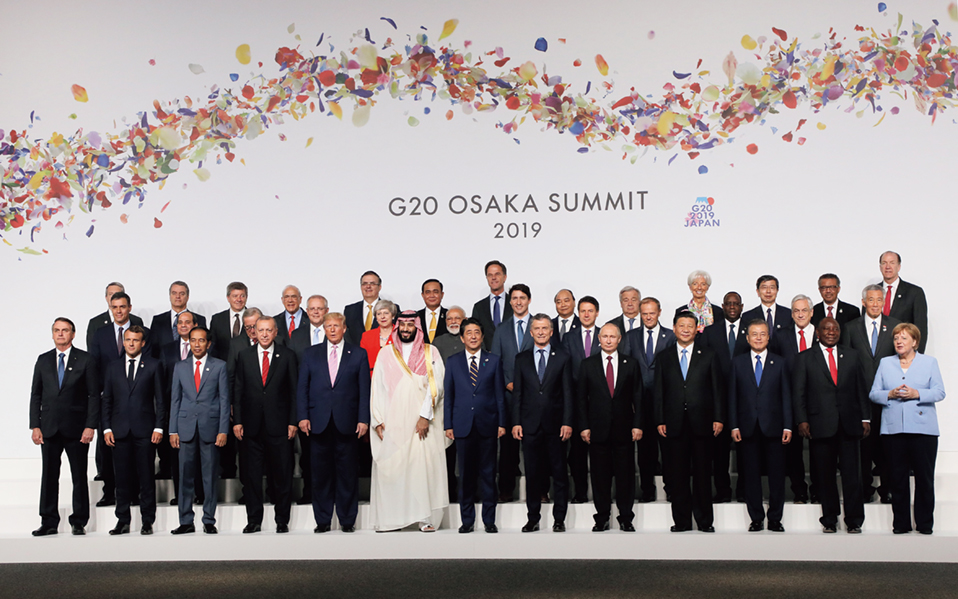
Prime Minister ABE Shinzo and other leaders of the participating countries, as well as representatives of international organizations, who attended the G20 Osaka Summit (Photo: G20 Osaka Summit website)
1 Connecting the World in 2019
Japan Demonstrated its Leadership through International Conferences
In 2019, Japan demonstrated leadership in the field of development cooperation. Japan hosted the G20 Osaka Summit under its Presidency for the first time in June, as well as the Seventh Tokyo International Conference on African Development (TICAD7) in August, whose venue returned to Japan after six years. In addition, the SDG Summit was held at the United Nations in September, which was the first summit-level meeting following the adoption of the Sustainable Development Goals (SDGs). At these meetings, Prime Minister Abe himself led discussions on development issues and global challenges which the world faces.
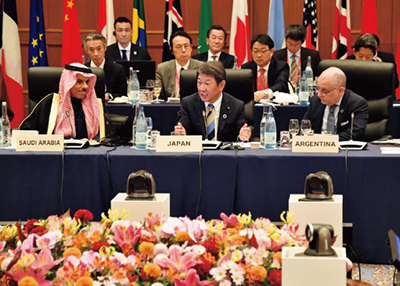
Foreign Minister Motegi hosting the G20 Aichi-Nagoya Foreign Ministers’ Meeting (November 2019)
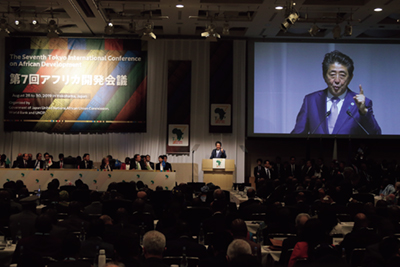
Prime Minister Abe giving his keynote speech at the Opening Ceremony/Plenary Session of TICAD7 (August 28, 2019)
◆G20 Osaka Summit
The G20 Osaka Summit held in June 2019 was a meeting that literally “connected the world,” as it was attended by eight invited countries, and representatives from nine international organizations, in addition to the G20 members. In each session addressing “Global Economy, Trade and Investment,” “Innovation (Digital Economy and Artificial Intelligence (AI)),” “Inequalities and Inclusive and Sustainable World,” and “Climate Change, Environment and Energy,” as the chair of the Summit, Japan proactively led discussions to seek commonality rather than confrontation, and succeeded in showing a commitment to jointly grappling with major issues of the world.
In particular, development issues were also discussed in ministerial meetings and Japan expressed its intention to seek to realize and promote a free and open, inclusive and sustainable “Human-Centered Future Society” through achieving both economic growth and addressing inequalities, as well as contributing to the development agenda and other global issues with the SDGs at its core.
The G20 Osaka Leaders’ Declaration, released as an outcome document of the Osaka Summit, specified that the G20 will lead efforts to foster development and address other global challenges to pave the way toward an inclusive and sustainable world. Specifically, the G20 Leaders delivered a strong message regarding various issues, such as the “G20 Principles for Quality Infrastructure Investment,” acceleration of efforts for women’s empowerment, human capital investment through quality education, utilization of science, technology, innovation (STI) to achieve the SDGs, efforts to achieve Universal Health Coverage (UHC), and addressing global environment and climate change issues including the “Osaka Blue Ocean Vision.”
As the culmination of Japan’s year of the G20 Presidency, the G20 Aichi-Nagoya Foreign Ministers’ Meeting was held in November 2019. Two of the three sessions of the Meeting were dedicated to “SDGs” and “Africa’s Development,” and the foreign ministers had candid exchanges of views. Consequently, the outcomes of the Osaka Summit and TICAD7 were reaffirmed, and the Aichi-Nagoya Foreign Ministers’ Meeting became a “springboard” leading to concrete action from 2020 and onwards. In addition, during the Meeting, representatives from local high schools submitted youthful and novel recommendations to create a new age by reducing the “Education gap,” in relation to the SDGs. Japan will closely cooperate with Saudi Arabia, the Presidency of the G20 Riyadh Summit in November 2020, toward its success.
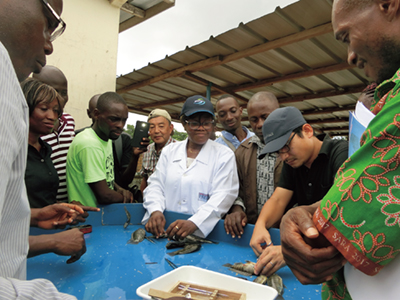
A Japan International Cooperation Agency (JICA) expert conducting training under the technical cooperation project, “Project for Revitalization of Inland Aquaculture Production in Cote d’Ivoire.” Japan provides comprehensive support from the development of fishing villages to policy advice through the combination of several projects including grant aid and technical cooperation, for the fishing industry in Cote d’Ivoire. (Photo: JICA)
◆TICAD7
The Government of Japan hosted TICAD7 in August 2019 in Yokohama with the participation of over 10,000 people, including 42 African leaders from 53 African countries, 52 development partner countries, 108 heads of international and regional organizations, as well as representatives from the private sector and civil society such as NGOs. Under the theme of “Advancing Africa’s development through people, technology and innovation,” six plenary sessions and five thematic sessions were held. The six plenary sessions were comprised of (1) Opening Ceremony, (2) Accelerating Economic Transformation and Improving Business Environment through Private Sector Development and Innovation, (3) Public-Private Business Dialogue, (4) Deepening Sustainable and Resilient Society, (5) Peace and Stability, and (6) Closing Ceremony. The five thematic sessions included (1) Science, Technology and Innovation, (2) Human Resource Development/Education for Youth, (3) Agriculture, (4) Climate Change/Disaster Risk Reduction, and (5) Blue Economy. On the margins of the Conference, four special conferences were convened, namely (1) Special Conference on Peace and Stability in the Sahel Region, (2) Special Conference on Peace and Stability in the Horn of Africa and the Neighboring Region, (3) Special Conference on Promoting Cooperation in the Western Indian Ocean, and (4) Luncheon with the Heads of International Organizations. In addition, a variety of side events, such as approximately 140 seminars and symposiums as well as around 100 exhibitions were held, which turned out to be the highest level in the history of TICAD.
Prime Minister Abe co-chaired the event with President El-Sisi of Egypt (then Chair of the African Union (AU)). TICAD7 consolidated its position as a foundation for building the future of Africa, and an international conference connecting the international community, including Japan, with Africa.
Unlike past TICAD meetings, the Government of Japan addressed promotion of business at the center of the discussion at TICAD7. As private companies were regarded as official partners for the first time in the history of TICAD, the Government of Japan convened Public-Private Business Dialogue between Japan and Africa at a plenary session. As a result, more than twice the number of companies (around 300 Japanese organizations and companies, as well as around 100 companies from Africa and other countries) participated in TICAD7 compared to TICAD VI, making TICAD7 a valuable opportunity to hold direct dialogues with heads of state and ministers. Participants presented concrete suggestions to expand trade and investment between Japan and Africa, and demonstrated strong expectations for expansion of Japan’s direct investment and human resource development in Africa.
The Yokohama Declaration 2019, adopted as an outcome document of TICAD7, reiterated the importance of Japan-Africa cooperation for issues such as quality infrastructure, impact investment by private sector, macro-economic stability, technological innovation, climate change measures, disaster risk reduction, human resource development, and institution building for achieving human security and human development. The Declaration also underscored the guiding principles of TICAD, including African ownership, international partnership, inclusiveness, and openness.
Japan will continue to robustly support efforts by African countries to realize Africa-led development, while deepening relations with Africa through its efforts, by taking advantage of Japan’s strengths and uniqueness.
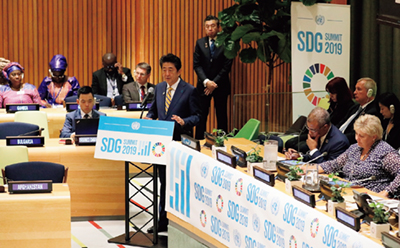
Prime Minister Abe giving a speech at the SDG Summit 2019 (Photo: Cabinet Public Relations Office of the Government of Japan)
◆SDG Summit 2019
The SDGs, which seek action from all countries, regardless of whether they are developed or developing countries, and aim to realize a sustainable, diverse, and inclusive society which will “leave no one behind,” are truly an initiative that “builds a better future by connecting the world.” In September 2019, the SDG Summit was held on the occasion of the United Nations General Assembly. The event was the first UN summit on the SDGs since the adoption of the 2030 Agenda, and Prime Minister Abe attended from Japan.
The Summit was held with the purpose of raising momentum toward achieving the SDGs, and conducted a comprehensive review of the progress of the SDGs in the past four years since its adoption. Prime Minister Abe shared Japan’s achievements in the promotion of the SDGs over the past four years, including the outcomes of the G20 Osaka Summit and TICAD7. Also, as the head of the SDGs Promotion Headquarters of Japan in which all of the cabinet ministers participate, he introduced that Japan has been promoting the SDGs, with the involvement of all the stakeholders, including through the Japan SDGs Award that commends organizations such as companies and other actors that are making outstanding efforts on sustainable development, as well as the SDGs Future Cities initiative that aims to build sustainable cities and regions. Furthermore, he stated that Japan would revise the “SDGs Implementation Guiding Principles,” its medium to long-term strategies for promoting the SDGs, by December to present Japan’s evolved “SDGs model.”
UN Secretary-General Guterres, President of the UN General Assembly Muhammad-Bande, heads of State and Government, and heads of international organizations participated in the Summit. UN Secretary-General Guterres stated that although the world is making progress, we are still far from where we need to be and must step up our efforts. For that purpose, he emphasized that it is important to take 1. Global action, 2. Local action, and 3. People action in order to gear up for “a decade of action” to deliver the SDGs by 2030.
The Political Declaration of the SDG Summit, the outcome document of the Summit, firstly recognizes the importance of the commitments toward achieving the SDGs and concerted action by all stakeholders, secondly reviews progress of the implementation of the commitments, and summarizes that although we have achieved progress in some areas such as reducing extreme poverty and child and neonatal mortality; improving access to electricity and safe drinking water; we are concerned that hunger is on the rise; progress towards gender equality is slow; inequalities in wealth, incomes and opportunities are increasing; biodiversity loss, environmental problems, marine plastic litter, climate change, and disaster risks are escalating, and thirdly recognizes the urgent need to accelerate action through mobilizing adequate financing, strengthening implementing institutions, bolstering local action to accelerate implementation, building resilience, harnessing science, technology and innovation (STI), and investing in data and statistics for the SDGs.
In light of the outcomes of the SDG Summit, Japan continues to be committed to making all efforts for the implementation of the SDGs both within and outside Japan.
Connecting the World with Quality Infrastructure
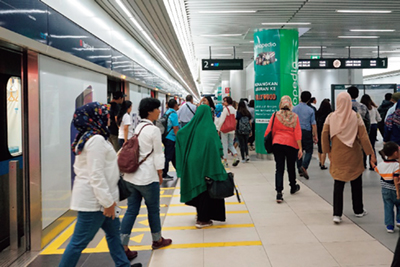
Passengers using the Mass Rapid Transit (MRT) network in Jakarta, which started its service in March 2019. Japan and Indonesia built the punctual and comfortable Jakarta MRT together by amassing their wisdom, and through this cooperation, Japan is transferring the know-how of operations and maintenance management as well as assisting in developing human resources (See “Stories from the Field” for details) (Photo: JICA)
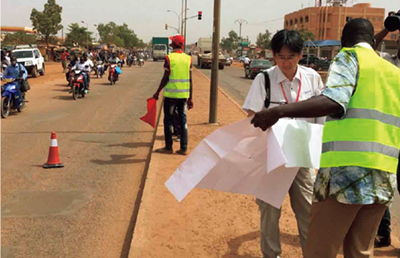
Conducting the preparatory survey for the grant aid “Project for Improvement of the southeastern Tansoba bypass in Ouagadougou” with the local infrastructure ministry personnel in Ouagadougou City, the capital of Burkina Faso (Photo: INGEROSEC Corporation)
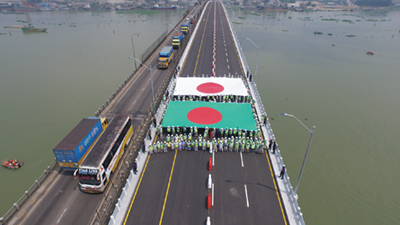
A group photograph of project members involved in a loan aid project for Bangladesh, “Kanchpur, Meghna and Gumti 2nd Bridges Construction and Existing Bridges Rehabilitation Project,” at the opening ceremony of the Meghna 2nd bridge (May 25, 2019) (Photo: Obayashi Corporation, Shimizu Corporation, JFE Engineering Corporation, IHI Infrastructure Systems Co., Ltd. Joint Venture)
In regard to the concept of quality infrastructure, active discussions and deliberations were held in the G20 Development Working Group and the Infrastructure Working Group toward formulating principles to maximize positive economic, environmental, social, and development impacts of infrastructure investment. The “G20 Principles for Quality Infrastructure Investment,” including the important elements such as openness, transparency, economic efficiency, and debt sustainability, were endorsed at the G20 Finance Ministers and Central Bank Governors Meeting held in Fukuoka in June 2019, and also endorsed by leaders at the G20 Osaka Summit.
These Principles were also welcomed at TICAD7, and Japan, as its contribution for quality infrastructure investment toward enhancing connectivity in Africa, announced its intention to promote projects with public-private cooperation through promoting quality infrastructure investment, strengthening and developing communications networks, postal service networks and infrastructure, and a joint initiative with the African Development Bank (AfDB) (EPSA4) (Note1), mainly in three priority areas (Note2). As for initiatives to ensure debt sustainability, Japan presented various examples of technical assistance by Japan for capacity building in Africa, including training on public debt and risk management in a total of 30 countries, dispatch of debt management and macro-economic policy advisors to Ghana, Zambia, and other countries, and new financial contributions to trust funds of the International Monetary Fund (IMF) and the World Bank. In addition, as one of the TICAD7 side events, the Ministry of Land, Infrastructure, Transport and Tourism hosted “The 2nd Africa-Japan Public-Private Conference for High-Quality Infrastructure” with the Japan-Africa Infrastructure Development Association (JAIDA), comprised of more than 180 companies, and JICA as co-sponsors, under the auspices of the Ministry of Foreign Affairs (MOFA). The Conference was also attended by African countries and the African Union (AU), and the participants confirmed that the public and private sectors will cooperate to promote quality infrastructure development in Africa.
In the Europa Connectivity Forum hosted by the European Union (EU) in Brussels in September 2019, Prime Minister Abe and former President of the European Commission Juncker signed a document entitled “The Partnership on Sustainable Connectivity and Quality Infrastructure between Japan and the European Union” in which, Japan and the EU have confirmed that they will “apply and promote” the G20 Principles for Quality Infrastructure Investment. Japan and the EU are working together in broad fields including quality infrastructure and strengthening connectivity.
Furthermore, on the occasion of the ASEAN-related Summit Meetings held in Thailand in November 2019, Prime Minister Abe emphasized the necessity of international standards such as openness for regional infrastructure development, and announced that Japan will promote quality infrastructure development. At the Japan-ASEAN Summit, in order to enhance regional connectivity through the promotion of quality infrastructure in accordance with international standards such as the “G20 Principles for Quality Infrastructure Investment,” Japan’s Partnership for Quality Infrastructure and the “Expanded Partnership for Quality Infrastructure” initiative were welcomed by ASEAN Leaders.
In December 2019, Foreign Minister Motegi attended the 14th Asia-Europe Meeting (ASEM) Foreign Ministers’ Meeting held in Spain. The Chair’s Statement issued after the Meeting stated that the ministers “recognized the importance of reliable, resilient, sustainable and high-quality infrastructure” and recalled the “need for connectivity investments to comply with agreed international principles.”
- Note 1: ESPA4 (Enhanced Private Sector Assistance for Africa (phase 4)): a joint initiative by Japan and the AfDB which aims to implement funding cooperation of $3.5 billion over the three-year period from 2020-2022.
- Note 2: The three areas spanning the East Africa Northern Corridor, the Nacala Corridor, and the West Africa Growth Ring.
